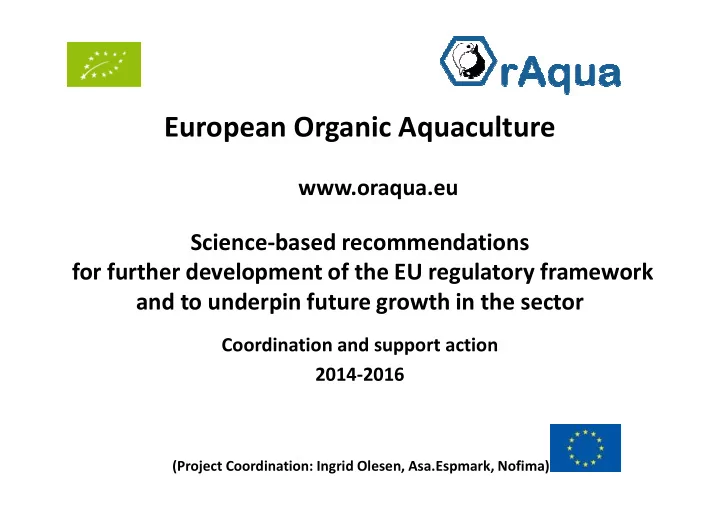

European Organic Aquaculture www.oraqua.eu Science-based recommendations for further development of the EU regulatory framework and to underpin future growth in the sector Coordination and support action 2014-2016 (Project Coordination: Ingrid Olesen, Asa.Espmark, Nofima)
Overall objective Recommendations for a new EU ‘organic’ regulation, - Based on the current scientific knowledge, - In line with the basic ‘organic’ principles, - Contributing to consumer confidence, to promote the growth of the organic sector in Europe.
Evolution of the regulation Recommendations are elaborated by an expert group: Expert Group for Technical Advice on Organic Production (EGTOP) - First report in December 2013, - Second report in July 2014, - Several amendments since 2013. - Proposition for a new regulation, . submitted by march 2014, . currently discussed at the EU parliament. End of the Oraqua project: December 2016.
The partners 1. Nofima, Norway 2. COISPA, Italy 3. DTU, Denmark 4. Ifremer, France 5. USB, Czech Republik 6. SLU, Sweden 7. DLO/IMARES, Netherlands 8. Debio Association, Norway 9. ICEA, Italy 10. ICROFS, Denmark 11. FEAP, Belgium 12. IZSVe, Italy 13. Culmarex SA, Spain
Objective and methods The new organic regulation has to concern the main aquaculture productions (fish, mollusks, shellfish and algae), and to be based on: - The most recent scientific knowledge: • Synthesis of the relevant peer review and grey literature , - Information from the interactions between the project consortium, the main actors of the aquaculture sector and the consumers using: • Collection of information through surveys, • A multi-stakeholder platform (balanced in terms of nationalities and of types of stakeholders), • The project website: www.oraqua.eu and dissemination documents .
Structure of the project: tools and information flows Tools Bibliographic reviews on - Expert groups D production and I socio-economy - Workshops SHs platform S - Desk studies n°1 (month 11, S - Surveys Istanbul) Integration, popularization E - Website and communication of - Facilitation M SHs platform results to stakeholders I - SHs platform n°2 (month 24, N Rotterdam) Analysis of the feed backs A - MCDA T SHs Platform n°3 (month 33) - SWOT I O Recommendations n -
Gathering of scientific knowledge • Production information – Feed and nutrition – Health, welfare, biosecurity and veterinary treatments – Production systems and their management – Interactions with the environment • Socio-economic information – Consumer perception and confidence issues – Competitiveness of organic products in the EU market – Analysis of institutional and regulation constraints – Analysis of socio-economic constraints
Interactions with the society - Dissemination of easily understandable information (documents, website , meetings…) - Collection and analysis of feedbacks from stakeholders (mail, website, meetings…) - Multi-stakeholder platform meetings: Platform 1 – Back to back with the meeting of the International Federation • of Organic Agriculture Movements (Ifoam), Istanbul October 2014: presentation of first bibliographic analysis and exchanges on the project in general (conditions for success, possible bottlenecks...) Platform 2 – October 19 et 20, 2015 in Rotterdam (back to back with • Aquaculture Europe 2015): presentation of finalized bibliographic studies, surveys for multi- criteria decision analysis (MCDA) on key questions Platform 3 – Mid-2016: • Presentation and discussion of recommendations.
Result of consumer survey 500 participants in Germany, Italy, France and UK About 20% consuming organic products Labels are usualy not well recognized: The EU label is not recognized by 85% of English, 70% of French, 64% of Italian and 60% of German.
Some controversial questions (from the last EGTOP report)
Organic juveniles Obligation of using organic juveniles since 2015: But too few organic hatcheries to answer the demand + categories of health status and genetic traits EGTOP propositions - Utilization of organic juveniles when available, - If not, at least 2/3 of the on-growing phase following the organic regulation, - Creation of a database on organic juvenile producers.
Dietary requirements of carnivorous fish Obligation to use ingredients from organic aquaculture: But lack - and badly balanced composition - of organic trimmings to produce fish and shrimp feed EGTOP proposition Possible utilization of: - whole fish from sustainable fisheries and not used for human consumption, - organic micro/macro entire organisms (rather than purified ingredients), - amino acids et lipids obtained by fermentation… only if specifically authorized.
Shrimp eyestalk ablation One of the basic organic principles is to avoid any kind of animal mutilation, so shrimp breeder eyestalk ablation is forbidden: But without eyestalk ablation, post larvae production is unpredictable, Collection of wild breeders is not desirable (without well documented management plan). EGTOP proposition Possible derogation on eyestalk ligation (no other method allowed).
Recirculation systems For economic reasons, recirculation systems - are operated at high rearing densities, - necessitate advanced water treatments (oxygenation), - are disconnected from the natural aquatic environment, which is not allowed by the organic principles. EGTOP proposition Possibility to partially reuse the rearing water (about 70%) after natural treatments (algae, bivalves, natural filters), meaning kind of IMTA…
Some dilemmas and questions… The new regulation should be based on scientific information, while respecting the organic principles and the perception of the consumer… who often considers that an organic fish is very close to a wild fish… What information exchange between the Oraqua project and the society, in order to change the wrong perception of the consumer, while promoting organic aquaculture products? To develop organic aquaculture, very well identified and differentiated products are needed… meaning stricter rules… resulting in higher prices… which limits the market development… what balance between strict rules and market development?
Some dilemmas and questions… The regulation tends to become more strict… with the risk of making the production process impossible. What balance between the reality of the production and a strict regulation? What efficient control of the full implementation of EU and Organic rules, for imported organic products (reared outside EU)? Only a co-constructed regulation, with all the actors, may result in a well recognized, acceptable and accepted label…
OrAqua project N°613547 Financing frame: EU FP7 Thank you for your attention! Site OrAqua: www.oraqua.eu
Recommend
More recommend